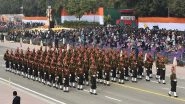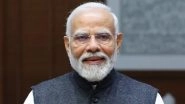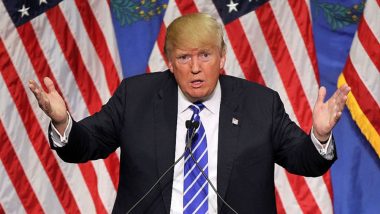That Donald Trump’s presidency would not be business as usual could have been predicted from the vitriolic campaign he ran during his candidature. But the apparent extent of his political decisions being outside the framework has come to many as a political shock. Mostly and especially those involved in US politics, those advising him and those witnessing his actions close hand.
But owing to the position he commands, it is not just Americans who have been impacted by Trump’s controversial policy decisions. As 2018 comes to an end and with it the second year of Trump’s presidency, here’s a look at the seven political decisions that sent shock-waves around the world.
1. Trade Tariffs against U.S.’s allies: Since World War II, the West – namely European Union and the U.S. and their NATO allies have worked in tandem. Be it security issues or trade. The co-operation is visible across the world – as NATO countries participated in the U.S.’ war on Iraq, Canada sent troops to Afghanistan and UK sent its fighter jets to Libya.
With this close partnership in security, Donald Trump’s unilateral decision to impose tariffs on steel and aluminium products imported into the U.S. – including from the EU, Japan and Canada came as a giant shock to these countries.
The G7 meeting in Canada failed to move the President on his decision. Trump has since used the slapping of tariffs to negotiate new trade deals with Canada, EU and Japan.
2. Trade War with China: Backing his rhetoric with words, Donald Trump unleashed in 2018 a trade war between the world’s two biggest economies. With the first round of tariffs being put into place in August and another round in September, the U.S. has put in place tariffs on $250 billion worth of goods being imported from China.
Trump has used the US economy as a bargaining chip to renegotiate trade terms but China is not one to give in. But the IMF has sounded the warning bell, saying “a trade war benefits no one” and so it remains to be seen if Donald Trump and Xi Jinping can agree to terms that will lift the $250 billion tariffs.
3. Russia did not ‘manipulate’ US elections: Since Donald Trump entered the office of the US president, he has been dogged by claims of Russian interference in the 2016 Presidential elections. He has obviously refuted the charges of collusion but investigations have indicted at least 12 Russians with interference and more are likely to come.
In this context and combine this with Russia’s growing alienation from the West – due to its positions on Syria and Crimea, the bilateral meeting between Donald Trump and Vladimir Putin was a significant development. However, the post-meet press conference shocked the US intelligence community as the US President publicly claimed to believe his Russian counterpart’s assurance over theirs that Moscow did not interfere in the US elections. Trump’s statement, “So I have great confidence in my intelligence people, but I will tell you that President Putin was extremely strong and powerful in his denial today," will perhaps be one of Trump’s most memorable lines on denying Russian interference in U.S. elections.
4. Singapore summit with Kim Jong-un: In 2017, the U.S. and North Korea seemed on the brink of war. The two leaders were trading insults and threats of whose ‘nuclear button is bigger than whom’. In 2018, there was an abrupt turn-around as the hermit nation of North Korea extended overtures to its southern neighbour and initiated a flurry of diplomatic activity that eventually resulted in the first meeting ever between a US President and the leader of North Korea.
The Singapore summit in June between Donald Trump and Kim Jong-un was probably the biggest news event of 2018. However, there has not been much forward movement on the demands placed by US to reduce the economic blockade of North Korea.
US Secretary of State Mike Pompeo’s last visit to Pyongyang was abruptly canceled as Donald Trump realised that Kim Jong-un’s promises of abandoning nuclear arms and his ballistic missiles programme was not going to be achieved easily. Critics say that apart from photos, the Singapore meeting did not result in any change in North Korea’s behaviour but it has allowed Kim Jong-un to come out of his self-imposed isolation and allowed him to publicly engage countries like China and Russia.
5. America First at the UN: The end of the World War II saw the growth of a truly multilateral world order albeit dominated by the U.S. The UN has led peace efforts across the world and countries can count on multilateral systems such as the World Bank, the International Monetary Fund and the World Trade Organisation to help them. However, Donald Trump at the 2018 UN General Assembly session proclaimed to the world leaders present that the U.S. was withdrawing from its position of a global leader and that all decisions will be taken with a look towards “America first.”
This statement means the space vacated by the US will be filled by countries such as Russia and China – leading to the rise of more conflicts across the world as new power plays come into executed.
6. Brett Kavanaugh: Donald Trump has had the opportunity to nominate judges to the various courts across the country. However, when a position opened up at the US Supreme Court bench, he appointed Brett Kavanaugh – a federal court judge who has written in the past that a sitting US President should not be charged of any criminal conduct. Basically, Trump was guaranteeing himself a vote if any investigations brought to light any criminal conduct of his – such as collusion with Russia during the 2016 elections.
If this decision was not controversial enough, Brett Kavanaugh them came to be accused by three different women of sexual misconduct. However, Donald Trump continued to support Kavanaugh’s nomination to the Supreme Court and he eventually made it to the bench.
Kavanaugh’s elevation to the Supreme Court will be 2018’s dark mark against women’s rights.
7. Revoking CNN Journalist Jim Acosta’s White House Pass: News media in the U.S. are rarely politically unbiased – they tend to support either of the two parties. CNN is known for its democratic leanings and has hence reported on Donald Trump’s policy decisions with a fairly critical voice. This has troubled Trump no end and he launched his own campaign against them, calling them “Fake News media” in his various political rallies and tweets.
However, this fight came to a head during a press conference after the US midterm election results. CNN’s principal White House Correspondent Jim Acosta confronted the US President with his fear-mongering against asylum seekers on the U.S.’s southern border to which Trump lashed out. The resulting spat led the White House to revoking Jim Acosta’s pass to be present for press briefings and reporting from the White House grounds.
A judge ruled that the White House could not revoke a reporter’s pass on such arbitrary grounds and Acosta was allowed to resume his work.
These seven instances highlight just a minuscule portion of the storm that is the Donald Trump’s presidency.
(The above story first appeared on LatestLY on Dec 24, 2018 04:00 PM IST. For more news and updates on politics, world, sports, entertainment and lifestyle, log on to our website latestly.com).













 Quickly
Quickly


